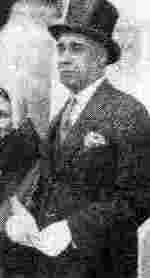Muhammad Shafi (politician)

Sir Mian Muhammad Shafi, KCSI, CIE (1869–1932) was born in the Arain Mian Family Baghbanpura Lahore,[1] an Indian Muslim politician. He went to England to study for the Bar in August 1889. He also took active interest in Anjuman-i-Islamiya of London and was elected its President for a term. As a practising Barrister he quickly gained renown and during the 1920s and 1930s he came to be regarded as one of India's leading lawyers.He is not to be confused with *Muhammad Shafi Usmani
Foundation of All India Muslim League
The name All-India Muslim League was proposed by a number of Muslims including Sir Mian Mohammad Shafi in the founding meeting of the League that was held on 30 December 1906 at the occasion of the annual All India Muhammadan Educational Conference, at the Ahsan Manzil Palace, Shahbagh, Dhaka that was hosted by Nawab Sir Khwaja Salimullah. The meeting was attended by three thousand delegates and presided over by Nawab Waqar-ul-Mulk. The others founding members were Nawab Mohsin-ul-Mulk, and Syed Ameer Ali, Mualana Muhammad Ali Johar.
Punjab Muslim League
Mian Muhammad Shafi organized a Muslim Association in early 1906, but when the All-India Muslim League was formed, he established its powerful branch in the Punjab of which he became the General Secretary. This branch, organized in November 1907, was known as the Punjab Provincial Muslim League.
He was also a member of the Simla Deputation in 1906. In 1909, and again in 1912, Shafi was nominated to the Provincial Legislative Council. In 1911, 1914, 1917, he was a member of the Imperial Legislative Council. He was appointed a CIE in 1916. In July 1919, Mian Muhammad Shafi, who had been elected as the President of the Chief Court Bar, became a member of the Viceroy’s Executive Council during 1919–24. His tenure as Education Member was marked by many important developments, including the setting up of the Muslim University of Aligarh. He was also acting Vice-President of the Governor-General's Execultive Council 1922–25. He was Council's member for education, health and later also for Law; also, he was knighted in 1925 with the KCSI.
After completing his term, he again became active in Muslim politics and played an important role when the Simon Commission visited India and, again, at the first Round Table Conference 1930–31.
His two daughters namely Begum Jahan Ara Shah Nawaz and Begum Geti Ara Bashir Ahmad earned fame as leading Muslim women who took active part in the Great Struggle for Pakistan. He was married to Mehrunissa, elder sister of Sir Abdul Rashid.
Titles
- 1869–1916: Mian Muhammad Shafi
- 1916–1925: Mian Muhammad Shafi, CIE
- 1925–1932: Sir Mian Muhammad Shafi, KCSI, CIE
References
Further reading
- Pershotam Mehra, A Dictionary of Modern Indian History (1707–1947)